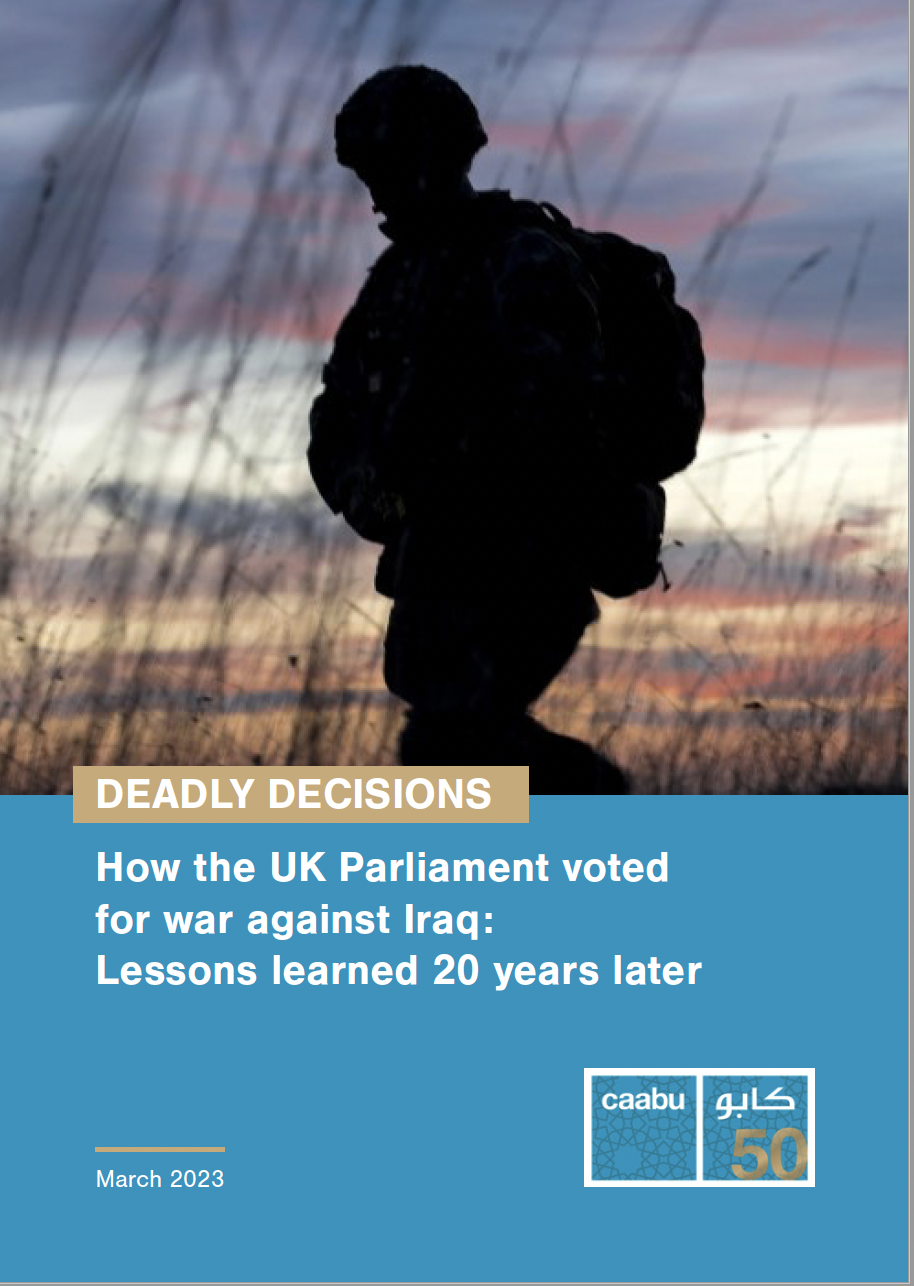Deadly Decisions
How the UK parliament voted for war against Iraq:
Lessons learned 20 years later
March 2023

The paper examines how the British Parliament assessed the issues surrounding the invasion of Iraq in 2003 and how it might hold the government to account more effectively in future. It argues that MPs need to devote more time to learning about conflict zones in order to improve policy debate and scrutiny when British involvement in military action comes before Parliament.
About the authors:
Chris Doyle has been the Director of Caabu since 2002. As an acknowledged expert on the region, he was heavily involved in briefing MPs and Lords at the time of the Iraq War as well as the later votes on interventions in Libya, Syria and against Da’esh. Chris has been a frequent commentator on TV and radio on all these conflicts.
Mandy Turner is Professor of Conflict, Peace and Humanitarian Affairs at the University of Manchester, UK. She has 20 years’ experience of teaching, researching, and writing about the Middle East, with eight years resident in East Jerusalem as director of a British Academy international research institute.
On 18 March 2003, the UK House of Commons approved military intervention in Iraq. The motion stated: “The decision of Her Majesty’s Government that the United Kingdom should use all means necessary to ensure the disarmament of Iraq’s weapons of mass destruction”.
This vote for UK military deployment was hugely significant for four reasons. First, it had a devastating impact on Iraq and the Middle East. Second, it signalled the emergence of a political convention to grant Parliament a veto over deployment decisions, even though the legal right to do so remains with the Prime Minister under the Royal Prerogative. Third, the decision had a negative impact on UK relations with the Arab world that continues to this day. And finally, it has cast a shadow over all subsequent debates on UK interventions accompanied by a worrying level of public distrust in government over intelligence related to such interventions.
As an advocacy group committed to promoting peaceful relations between the UK and the Middle East, Caabu believes it is crucial we understand how MPs made their decision and the influences that shaped their vote on the Iraq intervention. For this policy brief, published on the 20th anniversary of the vote, we interviewed a cross-section of MPs, former MPs and Lords who took part in the vote, from across the political spectrum, to include those who voted for, against, and abstained. We were additionally interested in how this vote influenced a new generation of MPs, so we also interviewed some MPs that joined the Commons after 2003. Experts on Iraq were also consulted. The questions that drove this research were:
- How interventions are considered in Parliament.
- What persuaded MPs to vote in a particular way.
- What kinds of knowledge on these issues were offered to MPs; did they feel sufficiently briefed?
- How did MPs feel about their votes now, with the benefit of hindsight? How has it influenced, if at all, how MPs think of deploying the UK military?
- How do MPs feel about the Royal Prerogative i.e., the ability of a government to declare war without parliamentary approval? Should parliamentary approval be mandatory?
- What parliamentary mechanisms could be adopted to improve the understanding of overseas interventions for a more informed debate?
- If you were not an MP at the time, what do you think of the Iraq vote, and how has it influenced you?
War is a devastating force that leaves a lasting impact on individuals and societies. The impact of war can be seen in the widespread loss of life, the destruction of infrastructure, ecological damage, the displacement of civilians, and widespread suffering and trauma. These impacts can be felt across generations; countries do not recover quickly from war.
The Iraq War had a profound impact on the country and its people. Two decades after the US-UK led invasion, Iraq continues to face significant challenges in terms of political instability, security, economic development, and social cohesion.
Decisions to go to war must seriously consider the consequences of such action. The aim of this policy brief is to examine ways in which future debates and votes can be aided to ensure that Parliament can be more effective when faced with these difficult and deadly decisions.
To read the paper, please see below
